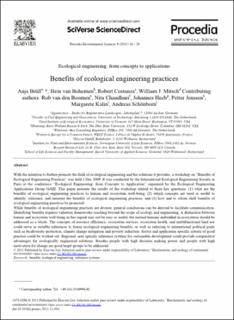Please use this identifier to cite or link to this item:
https://doi.org/10.21256/zhaw-3778Full metadata record
| DC Field | Value | Language |
|---|---|---|
| dc.contributor.author | Brüll, A. | - |
| dc.contributor.author | van Bohemen, H. | - |
| dc.contributor.author | Costanza, R. | - |
| dc.contributor.author | Mitsch, W. J. | - |
| dc.contributor.author | van den Boomen, R. | - |
| dc.contributor.author | Chaudhuri, N. | - |
| dc.contributor.author | Heeb, J. | - |
| dc.contributor.author | Jenssen, P. | - |
| dc.contributor.author | Schönborn, Andreas | - |
| dc.date.accessioned | 2018-06-26T12:55:50Z | - |
| dc.date.available | 2018-06-26T12:55:50Z | - |
| dc.date.issued | 2011 | - |
| dc.identifier.issn | 1878-0296 | de_CH |
| dc.identifier.uri | https://digitalcollection.zhaw.ch/handle/11475/7315 | - |
| dc.description.abstract | With the intention to further promote the field of ecological engineering and the solutions it provides, a workshop on “Benefits of Ecological Engineering Practices” was held 3 December 2009. It was conducted by the International Ecological Engineering Society in Paris at the conference “Ecological Engineering: from Concepts to Application” organized by the Ecological Engineering Applications Group GAIE. This paper presents the results of the workshop related to three key questions: (1) what are the benefits of ecological engineering practices to human and ecosystem well-being, (2) which concepts are used or useful to identify, reference, and measure the benefits of ecological engineering practices, and (3) how and to whom shall benefits of ecological engineering practices be promoted. While benefits of ecological engineering practices are diverse, general conclusions can be derived to facilitate communication. Identifying benefits requires valuation frameworks reaching beyond the scope of ecology and engineering. A distinction between human and ecosystem well-being in this regard may not be easy or useful, but instead humans embedded in ecosystems should be addressed as a whole. The concepts of resource efficiency, ecosystem services, ecosystem health, and multifunctional land use could serve as suitable references to frame ecological engineering benefits, as well as referring to international political goals such as biodiversity protection, climate change mitigation and poverty reduction. Sector and application specific criteria of good practice could be worked out. Regional, area specific reference systems for sustainable development could provide comparative advantages for ecologically engineered solutions. Besides people with high decision making power and people with high motivation for change are good target groups to be addressed. | de_CH |
| dc.language.iso | en | de_CH |
| dc.publisher | Elsevier | de_CH |
| dc.relation.ispartof | Procedia Environmental Sciences | de_CH |
| dc.rights | http://creativecommons.org/licenses/by-nc-nd/3.0/ | de_CH |
| dc.subject | Ecological engineering | de_CH |
| dc.subject | Benefit | de_CH |
| dc.subject | Reference system | de_CH |
| dc.subject.ddc | 620: Ingenieurwesen | de_CH |
| dc.title | Benefits of ecological engineering practices | de_CH |
| dc.type | Konferenz: Paper | de_CH |
| dcterms.type | Text | de_CH |
| zhaw.departement | Life Sciences und Facility Management | de_CH |
| zhaw.organisationalunit | Institut für Umwelt und Natürliche Ressourcen (IUNR) | de_CH |
| dc.identifier.doi | 10.21256/zhaw-3778 | - |
| dc.identifier.doi | 10.1016/j.proenv.2011.11.004 | de_CH |
| zhaw.conference.details | International Congress Ecological Engineering: from Concepts to Applications, Paris, France, 2-4 December 2009 | de_CH |
| zhaw.funding.eu | No | de_CH |
| zhaw.originated.zhaw | Yes | de_CH |
| zhaw.pages.end | 20 | de_CH |
| zhaw.pages.start | 16 | de_CH |
| zhaw.publication.status | publishedVersion | de_CH |
| zhaw.volume | 9 | de_CH |
| zhaw.publication.review | Peer review (Abstract) | de_CH |
| zhaw.webfeed | Ökotechnologie | de_CH |
| Appears in collections: | Publikationen Life Sciences und Facility Management | |
Files in This Item:
| File | Description | Size | Format | |
|---|---|---|---|---|
| 1-s2.0-S1878029611007663-main.pdf | 389.16 kB | Adobe PDF |  View/Open |
Show simple item record
Brüll, A., van Bohemen, H., Costanza, R., Mitsch, W. J., van den Boomen, R., Chaudhuri, N., Heeb, J., Jenssen, P., & Schönborn, A. (2011). Benefits of ecological engineering practices [Conference paper]. Procedia Environmental Sciences, 9, 16–20. https://doi.org/10.21256/zhaw-3778
Brüll, A. et al. (2011) ‘Benefits of ecological engineering practices’, in Procedia Environmental Sciences. Elsevier, pp. 16–20. Available at: https://doi.org/10.21256/zhaw-3778.
A. Brüll et al., “Benefits of ecological engineering practices,” in Procedia Environmental Sciences, 2011, vol. 9, pp. 16–20. doi: 10.21256/zhaw-3778.
BRÜLL, A., H. VAN BOHEMEN, R. COSTANZA, W. J. MITSCH, R. VAN DEN BOOMEN, N. CHAUDHURI, J. HEEB, P. JENSSEN und Andreas SCHÖNBORN, 2011. Benefits of ecological engineering practices. In: Procedia Environmental Sciences. Conference paper. Elsevier. 2011. S. 16–20
Brüll, A., H. van Bohemen, R. Costanza, W. J. Mitsch, R. van den Boomen, N. Chaudhuri, J. Heeb, P. Jenssen, and Andreas Schönborn. 2011. “Benefits of Ecological Engineering Practices.” Conference paper. In Procedia Environmental Sciences, 9:16–20. Elsevier. https://doi.org/10.21256/zhaw-3778.
Brüll, A., et al. “Benefits of Ecological Engineering Practices.” Procedia Environmental Sciences, vol. 9, Elsevier, 2011, pp. 16–20, https://doi.org/10.21256/zhaw-3778.
Items in DSpace are protected by copyright, with all rights reserved, unless otherwise indicated.